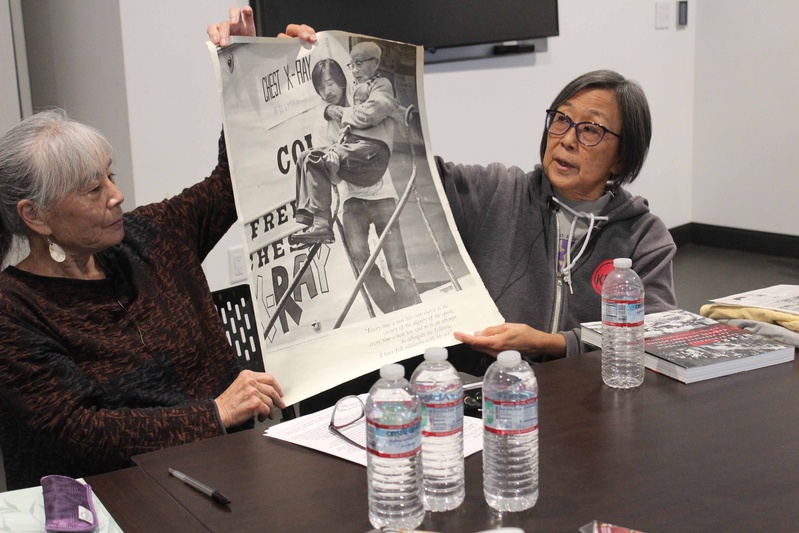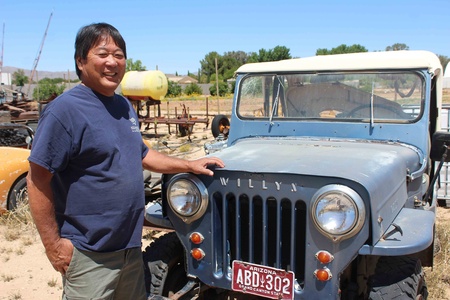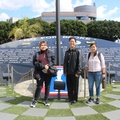Throughout the making of this podcast series, have you gained more insight into your own identity? Did you find individuals’ stories and experiences relatable? Are there differences?
Higashitani: My artistic identity has not changed but it was strengthened by the stories that we learned. I recently interviewed Henry Kaku who was born stateless because his father served in the U.S. Army before WWII but the father’s American citizenship was taken away and he was sent to Japan after WWII. He talks about how his family was minority among minorities.
I also interviewed Kenji Taguma whose father is a Nisei draft resister who stood for his rights during World War II. Those individuals who exhibited courage against power and majority reminded me the importance of thinking independently and critically because what is right could be very confusing depending on the time and place we live.
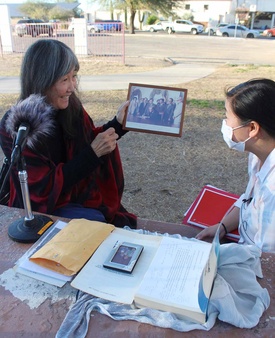
Jie Baxter: America is considered a melting pot and it really challenges my idea of what it means to be an American. If I am a Chinese American, is that still being an American or Chinese person living in America? So the American history that’s being taught needs to be broadened to include all the different minorities and races and ethnicities of people who are often silenced.
I was surprised just how little I knew about Japanese American history because I thought that I was taught what it was like in fifth or sixth grade history class, but talking to all these different people and hearing just how complex and how all these people had different experiences, it really made me see like we’re not being taught any of this and there’s so much more to these stories that are very valuable that we should be telling. There’s so much that we can still learn from just listening to others.
Sawan Subsin: I always refer to this podcast as the spark that inspired me to advocate for not only my community but also other underrepresented communities. Chasing Cherry Blossoms allowed me to take the first steps towards understanding and accepting myself within the AAPI community as well as inspiring me to learn more about the history and culture of other communities. I could see myself in every person I interviewed as I realized that although our communities overcame numerous challenges, we are always able to find hope. I wish to pass that vision of hope to the future generations.
Who do you aim to reach with this podcast? Is it geared mainly for the Japanese American community? The Asian American community as a whole? For older or younger generations?
Higashitani: I hope it reaches everyone regardless of their background. Our junior producers are not from Japanese American communities, yet they relate to Japanese American experiences because they deal with similar issues as individuals with multicultural backgrounds. We have to overcome any boundaries that separate us and build empathy if we want to create a better society for future generations.
What impact do you wish to make with this podcast series? Why are projects like these important?
Higashitani: It is very important to acknowledge that history is made by everyone, not only by people in power or privileged class. That notion gives us strength in navigating our lives in current society. For example, before coming to Arizona, I didn’t know much about its experience with immigrants, but the state has an abundant history with Japanese Americans since the 19th century. Hundreds of acres of the land were once cultivated by Japanese American farmers who created thriving agriculture communities, producing and delivering products across and beyond the state. Traces of those histories are disappearing from public view.
I want to document those memories to honor our ancestors. They help us grow pride in our heritage and build respect for one another. Especially when the nation grapples with increasing divides and tensions around the world, we need to be reminded of how we can bind together with common human experiences and reimagine our better future.
Sawan Subsin: I would love for our listeners to be inspired to not only connect with their own communities but reach out and build bridges to communities outside their own. I hope that they can listen to their stories with an open heart and an open mind. By doing so, I would also hope our listeners will be able to share their cultures with one another as well as preserve cultures and traditions. I believe this need for documenting and archiving stories, especially those from historically marginalized communities, is why projects such as Chasing Cherry Blossoms are so important.
What other thoughts would you like to share with readers at Discover Nikkei?
Higashitani: Thank you for your interest in learning about our work. Please subscribe to our podcast! More information can be found at our website.
* * * * *
After listening to the Chasing Cherry Blossoms podcast and connecting with Reina, Catherine, and Tinnley to gather their responses and insight, I feel that I have been able to connect more with my own heritage, develop a more thorough understanding of Japanese American history and culture, and be inspired by the stories of real people. I hope that Japanese Americans’ stories continue to be shared and understood not exclusively as Japanese American history to be shared and known only by a distinct community, but as undeniably American history that sees no boundaries.
Together, the compelling interviews and stories collected through the podcast give a valuable glimpse into the unique realities that have shaped the diverse Japanese American experience. The project allows for stories and perspectives that have so often been buried or suppressed to finally come to light and inspire us all, regardless of our background. Through meaningful storytelling, Chasing Cherry Blossoms opens the door for important dialogue that frames and preserves the powerful legacies which continue to shape the fabric of the Japanese American community and beyond.
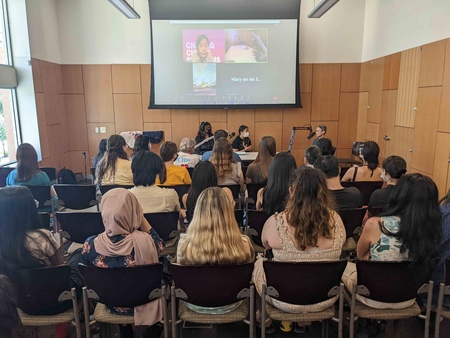
* * * * *
The Chasing Cherry Blossoms Team:
Reina Higashitani, Producer
Born and raised in Japan, Higashitani is a filmmaker and Assistant Professor at Sidney Poitier New American Film School at Arizona State University. As a member of the Television Academy, she has produced over 50 independent films, media projects, and TV documentaries that were broadcast on PBS and HBO. Her works explore community-involved storytelling rooted in her transnational identity.
Catherine Jie Baxter, Junior Producer
Cat is a senior at Arizona State University in Herberger Arts, Media, and Engineering School and Barrett, The Honors College. She is a Digital Culture Media Processing major and hopes to become an audio engineer after graduation. She is a first-generation Chinese immigrant, having been adopted from China as a baby. She is hoping to gain new, applicable skills as well as a chance to find answers to her own sense of identity as a Chinese American.
Tinnley Sawan Subsin, Junior Producer
Tin is a senior at Arizona State University studying Medical Microbiology with a minor in Writing, Rhetorics, and Literacies. She’s biracial as her father’s side of the family immigrated from Thailand. She was born and raised in Arizona and although she identifies as Asian American, she often feels disconnected from Thai culture. She is interested in hearing other people’s experiences with finding their identities and learning how she could apply their advice to her own journey.
© 2024 Emily Hood


